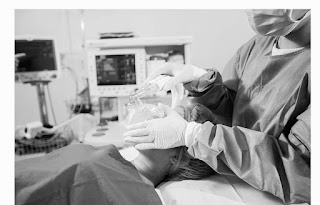Baroreceptor Reflexes
Baroreceptor Reflexes
Keywords: baroreceptor reflexes, blood pressure regulation, baroreceptors, autonomic nervous system, carotid sinus, aortic arch, cardiovascular control, homeostasis, reflex arc, hypertension
Baroreceptor reflexes are an essential part of the body's autonomic nervous system, responsible for regulating blood pressure and maintaining homeostasis. Baroreceptors are specialized cells located in the walls of blood vessels, particularly in the carotid sinus and aortic arch. They detect changes in blood pressure and send signals to the brainstem, which then regulates blood pressure through various mechanisms.
When blood pressure increases, baroreceptors detect the change and send signals to the brainstem to decrease sympathetic nervous system activity, resulting in a decrease in heart rate and vasodilation of blood vessels. This response ultimately leads to a decrease in blood pressure. Conversely, when blood pressure decreases, baroreceptors send signals to increase sympathetic nervous system activity, resulting in an increase in heart rate and vasoconstriction of blood vessels, ultimately leading to an increase in blood pressure.
Baroreceptor reflexes are crucial for maintaining blood pressure within a normal range. Without this feedback system, blood pressure could easily become too high or too low, leading to serious health consequences. For example, if blood pressure becomes too high, it can lead to hypertension, which is a risk factor for heart disease, stroke, and kidney failure. On the other hand, if blood pressure becomes too low, it can lead to decreased blood flow to vital organs, such as the brain and kidneys, which can result in organ damage or failure.
In addition to regulating blood pressure, baroreceptor reflexes also play a role in the body's response to stress. When the body experiences stress, such as during exercise or a fight-or-flight response, the sympathetic nervous system is activated, resulting in an increase in heart rate and blood pressure. The baroreceptor reflexes help to modulate this response, preventing blood pressure from getting too high and causing harm to the body.
Baroreceptor reflexes can be affected by various factors, such as aging, medications, and certain medical conditions. For example, as we age, the baroreceptors become less sensitive, which can lead to difficulty regulating blood pressure. Certain medications, such as beta-blockers, can also affect baroreceptor reflexes, leading to a decrease in heart rate and blood pressure. Medical conditions such as diabetes, kidney disease, and heart failure can also affect baroreceptor function, leading to difficulty regulating blood pressure.
In conclusion, baroreceptor reflexes are an essential component of the body's autonomic nervous system, responsible for regulating blood pressure and maintaining homeostasis. These reflexes play a crucial role in preventing hypertension and other cardiovascular diseases. Understanding the function of baroreceptor reflexes can help healthcare professionals develop effective treatment strategies for patients with hypertension and other cardiovascular diseases.
There are two main baroreceptor reflexes in the body: the carotid sinus reflex and the aortic arch reflex.
The carotid sinus reflex is responsible for regulating blood pressure in the head and neck. It involves baroreceptors located in the carotid sinus, which is a dilation at the base of the internal carotid artery, located in the neck. When blood pressure increases, these baroreceptors detect the change and send signals via the glossopharyngeal nerve to the brainstem, which then decreases sympathetic nervous system activity and increases parasympathetic nervous system activity. This results in a decrease in heart rate and vasodilation of blood vessels, ultimately leading to a decrease in blood pressure.
The aortic arch reflex is responsible for regulating blood pressure in the rest of the body. It involves baroreceptors located in the walls of the aortic arch, which is the portion of the aorta closest to the heart. When blood pressure increases, these baroreceptors detect the change and send signals via the vagus nerve to the brainstem, which then decreases sympathetic nervous system activity and increases parasympathetic nervous system activity. This results in a decrease in heart rate and vasodilation of blood vessels, ultimately leading to a decrease in blood pressure.
Both of these reflexes work together to regulate blood pressure in the body. When blood pressure increases, both reflexes are activated, resulting in a coordinated response to decrease blood pressure. Conversely, when blood pressure decreases, both reflexes are activated to increase blood pressure.
It's important to note that the baroreceptor reflexes are not the only mechanisms involved in blood pressure regulation. Other factors, such as the renin-angiotensin-aldosterone system and the kidneys, also play a role in blood pressure regulation. However, the baroreceptor reflexes are critical in maintaining blood pressure within a normal range and preventing cardiovascular diseases.


